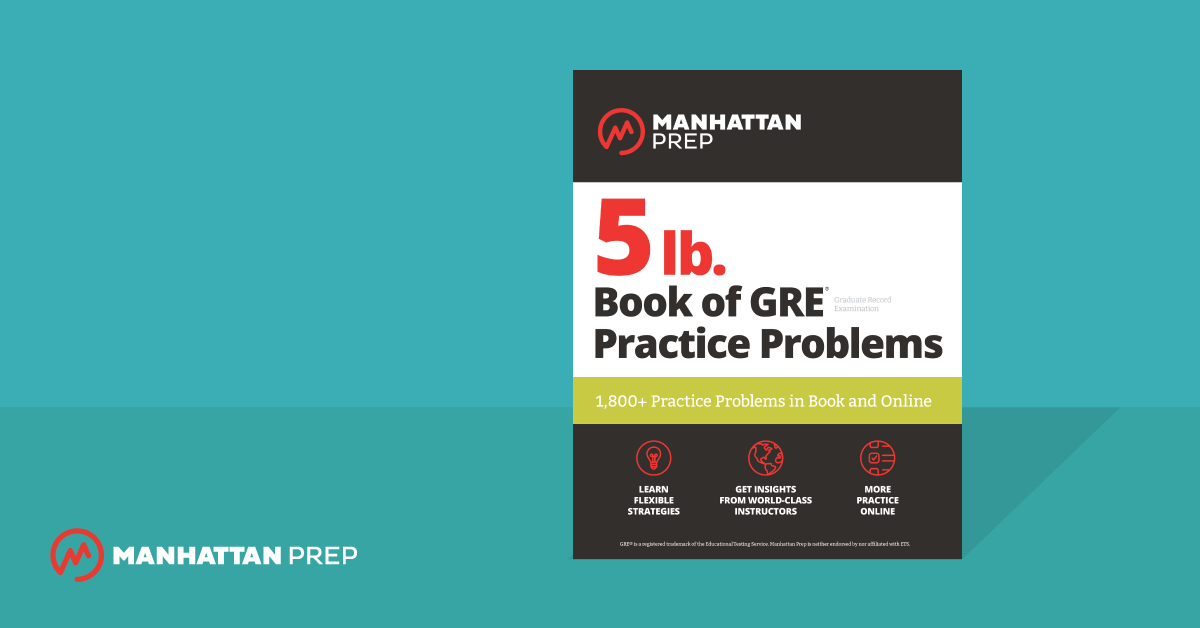The NEW Manhattan Prep 5 lb. Book of GRE Practice Problems is Out Now!

We have some exciting news to share in GRE Land—a new edition of our bestselling 5 lb. Book of GRE Practice Problems enters the world today! If you aren’t familiar with the 5 lb. Book, let me tell you—it’s my favorite of all the Manhattan Prep GRE products. I destroyed it when I was studying for the test. Struggling with exponents, I tore out the exponents chapter and did them on the train. Worried about rates and work problems, I cut them out of its pages and carried a stack around with me to do and redo in my downtime. I ransacked the chapters of any topic that I found difficult or daunting. (Can you say combinatorics? No, I mean literally, can you say it? Because I couldn’t until I started working here at Manhattan Prep.) I love that the chapters are organized by topic, so you decide where you need practice and take a targeted deep dive. With over 2,000 GRE practice problems, you’re going to find the practice you need.
With this new edition, my favorite GRE book gets even better. Here’s what we’ve added… Read more
Using The 5 lb. Book To Study Advanced Quant
I’ve got another one for you from our 5 lb. Book of GRE Practice Problems, and this one’s serious. I took it from the Advanced Quant chapter. Try it out and then we’ll chat!
Triplets Adam, Bruce, and Charlie enter a triathlon. There are nine competitors in the triathlon. If every competitor has an equal chance of winning, and three medals will be awarded, what is the probability that at least two of the triplets will win a medal?
(A) 3/14
(B) 19/84
(C) 11/42
(D) 15/28
(E) 3/4
© ManhattanPrep, 2013
 Yuck. I’m not a fan of probability in general and this one is particularly annoying. Why? Because they ask for the probability that at least two will win. Most of the time, when a probability question uses at least or at most language, we can use the cool 1 “ x shortcut because there’s only one not-included case.
Yuck. I’m not a fan of probability in general and this one is particularly annoying. Why? Because they ask for the probability that at least two will win. Most of the time, when a probability question uses at least or at most language, we can use the cool 1 “ x shortcut because there’s only one not-included case.
For example, if I tell you I’m going to flip a coin three times, I might ask you to calculate the probability that I’ll get at least one heads. There’s only one case where I wouldn’t: zero heads. So you can just calculate the probability of zero heads and subtract from 1.
But we can’t do that here, because it’s possible for just 1 twin to win a medal and it’s also possible for zero twins to win a medal. Sigh.
Okay, how are we going to tackle this? Probability is a measure of the number of desired outcomes divided by the total number of possibilities. Let’s figure out the total number of possibilities first.
Take a look at the question again. Is this one of those questions where the order matters? If you don’t win, you don’t win. If you do win, does the question make a distinction between coming in first, second, or third?
The 5 lb. Book: How to Study Text Completions

We’ve very excited because our latest book, the 5 lb Book of GRE Practice Problems, is about to hit shelves! The book contains more than 1,100 pages of practice problems (and solutions), so you can drill on anything and everything that might be giving you trouble.
Let’s try out one of the problems! This Text Completion (TC) problem has just one blank, so give yourself approximately 45 seconds to get to your answer. Afterwards, we’ll solve the problem and also discuss how to approach TC questions in general.
After many years of war and bloodshed, some become ____________ suffering, casting a blind eye to scenes of misery around them.
inured to exempted from dominant over effusive towards maudlin over © ManhattanPrep, 2013
There are several important steps that help us to answer TC questions both effectively and efficiently.
(1) Read only the sentence
Read all the way to the period, but do NOT then jump to the answer choices. Instead